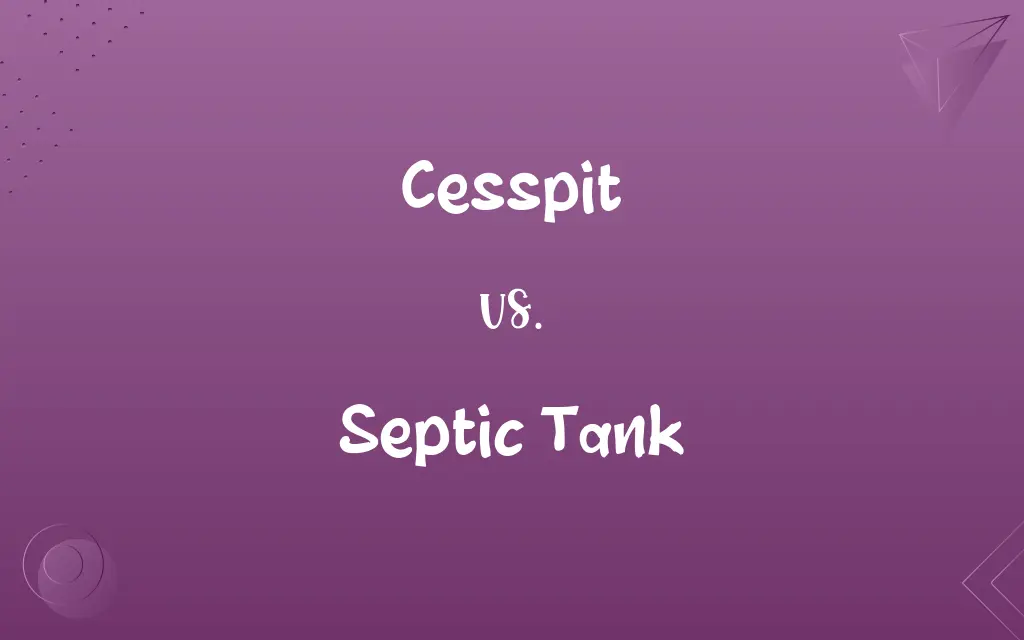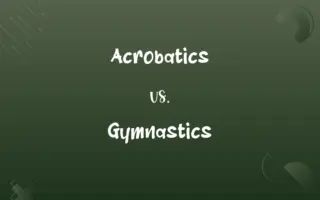Cesspit vs. Septic Tank: Know the Difference

By Shumaila Saeed & Dua Fatima || Published on April 30, 2024
Cesspits are simple, sealed underground containers for waste with no treatment process, requiring frequent emptying; septic tanks process and filter waste, releasing treated water into the ground.

Key Differences
Cesspits and septic tanks are both used for sewage disposal in areas without access to municipal sewage systems, but they operate quite differently. A cesspit is a sealed underground container that collects wastewater and sewage. In contrast, a septic tank is part of a more complex system that not only collects but also treats wastewater. It separates solids from liquids, breaking down organic matter through a biological process involving bacteria.
Dua Fatima
Apr 30, 2024
Cesspits doesn't treat the waste but simply stores it until it's removed. This means cesspits need to be emptied regularly, depending on the size of the pit and the amount of waste produced, which can be costly and inconvenient. Septic Tank treated water (effluent) is then discharged into a drainage field, where further natural filtration occurs in the soil. This process significantly reduces the need for frequent emptying compared to cesspits, making septic tanks a more sustainable and cost-effective solution for long-term waste management.
Shumaila Saeed
Apr 30, 2024
Cesspits are simpler and cheaper to install, their long-term maintenance can be more expensive due to the need for regular emptying by specialized vehicles. Septic tanks, although more expensive upfront due to their complex installation involving a drainage field, offer the advantage of processing and partially purifying wastewater before it's released back into the environment, thus reducing environmental impact and potentially the frequency and cost of maintenance.
Dua Fatima
Apr 30, 2024
Cesspits can pose a higher risk of contamination to nearby water sources if not properly maintained or if they overflow. Septic tanks, with their ability to treat wastewater, are generally considered more environmentally friendly, as they reduce the risk of pollution by effectively processing the waste before releasing it.
Shumaila Saeed
Apr 30, 2024
Regulatory aspects also vary between the two systems. Many regions have specific regulations governing the installation, maintenance, and inspection of septic tanks to ensure they operate effectively and don't harm the environment. Cesspits, while still subject to regulations, often face stricter controls or are discouraged due to their higher environmental risks and the potential for health hazards associated with sewage overflow or leakage.
Dua Fatima
Apr 30, 2024
ADVERTISEMENT
Comparison Chart
Environmental Impact
Higher risk of contamination
Processes waste, lower risk of pollution
Shumaila Saeed
Apr 30, 2024
ADVERTISEMENT
Regulatory Considerations
Often subject to strict regulations
Regulated, with requirements for operation and maintenance
Dua Fatima
Apr 30, 2024
Suitability
Temporary solutions or where other systems are impracticable
Long-term waste management solution
Shumaila Saeed
Apr 30, 2024
Cesspit and Septic Tank Definitions
Cesspit
A sealed underground container for temporary waste storage.
Their remote cabin used a cesspit due to its isolated location.
Dua Fatima
Feb 27, 2024
Septic Tank
Governed by specific regulations to ensure safety and efficiency.
They complied with local septic tank regulations to avoid penalties.
Dua Fatima
Feb 27, 2024
ADVERTISEMENT
Cesspit
Requires regular, professional emptying to prevent overflow.
They scheduled monthly cesspit emptying to manage sewage waste.
Hifza Nasir
Feb 27, 2024
Septic Tank
Reduces environmental impact by treating sewage onsite.
Installing a septic tank was part of their commitment to sustainable living.
Dua Fatima
Feb 27, 2024
Cesspit
Offers a simple, albeit less sustainable, sewage solution.
Opting for a cesspit was a quick fix for their sewage disposal needs.
Shumaila Saeed
Feb 27, 2024
Septic Tank
Requires less frequent maintenance than cesspits.
Their septic tank only needed inspection and pumping every few years.
Shumaila Saeed
Feb 27, 2024
Cesspit
Can be more expensive in the long run due to maintenance costs.
The high cost of cesspit emptying prompted them to consider alternatives.
Dua Fatima
Feb 27, 2024
Septic Tank
Includes a drainage field for natural soil filtration.
The septic tank's effluent was released into the drainage field for final purification.
Shumaila Saeed
Feb 27, 2024
Cesspit
Risk of environmental contamination if not carefully managed.
They upgraded from a cesspit to reduce the risk of groundwater contamination.
Shumaila Saeed
Feb 27, 2024
Septic Tank
A sewage treatment system that separates and processes waste.
Their new home's septic tank efficiently handled all wastewater.
Dua Fatima
Feb 27, 2024
Cesspit
A cesspool; a pit or covered cistern used to collect sewage and waste water.
Shumaila Saeed
Feb 27, 2024
Repeatedly Asked Queries
Are there any legal considerations to keep in mind?
Yes, local codes and regulations often dictate the use, installation, and maintenance of both cesspits and septic tanks.
Dua Fatima
Apr 30, 2024
Can a septic tank overflow like a cesspit?
Properly sized and maintained septic tanks are less likely to overflow due to their treatment and dispersal process.
Shumaila Saeed
Apr 30, 2024
How do I choose between a cesspit and a septic tank?
Consider long-term costs, environmental impact, maintenance requirements, and local regulations.
Dua Fatima
Apr 30, 2024
What's the main advantage of a septic tank over a cesspit?
Septic tanks treat and dispose of wastewater onsite, reducing environmental impact and maintenance costs compared to cesspits.
Dua Fatima
Apr 30, 2024
How often does a cesspit need to be emptied?
It varies based on use and size but typically several times a year to prevent overflow.
Shumaila Saeed
Apr 30, 2024
Why are cesspits considered less environmentally friendly?
Cesspits don't treat waste, posing a higher risk of soil and water contamination if they leak or overflow.
Hifza Nasir
Apr 30, 2024
Is it cheaper to install a cesspit or a septic tank?
Initially, cesspits are cheaper to install, but septic tanks may be more cost-effective in the long run due to lower maintenance costs.
Dua Fatima
Apr 30, 2024
Can either system be used anywhere?
Suitability depends on soil type, space, and local regulations; septic tanks require suitable conditions for a drainage field.
Dua Fatima
Apr 30, 2024
What maintenance is required for a septic tank?
Regular inspections and periodic pumping to remove solids, typically every 3-5 years.
Dua Fatima
Apr 30, 2024
What happens if a cesspit is not emptied regularly?
It can overflow, leading to environmental contamination and potential health hazards.
Shumaila Saeed
Apr 30, 2024
Share this page
Link for your blog / website
HTML
Link to share via messenger
About Author
Written by
Shumaila SaeedShumaila Saeed, an expert content creator with 6 years of experience, specializes in distilling complex topics into easily digestible comparisons, shining a light on the nuances that both inform and educate readers with clarity and accuracy.
Co-written by
Dua Fatima







































































